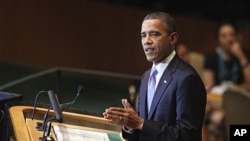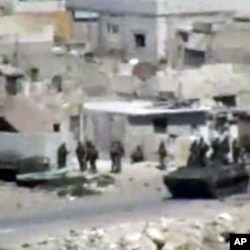President Barack Obama has addressed the 66th United Nations General Assembly about what he calls a time of transformation, especially in the Middle East and Africa.
In his roughly 35-minute address, the president went down a list of events in which he said nations "stepped forward" to maintain international peace and security, and "more individuals claimed their universal right to live in freedom and dignity."
Beginning in Africa, he noted that South Sudan obtained its independence and the people of Ivory Coast had weathered its political upheaval and is now governed by the man elected to lead them.
Obama turned to the so-called Arab Spring ,beginning with Tunisia, where he said people "chose the dignity of peaceful protest over the rule of an iron fist." He then spoke about Egypt.
|
Palestinian Statehood Bid Breakdown
|
"Egyptians from all walks of life - men and women; young and old; Muslim and Christian - demanded their universal rights," said Obama. "We saw in those protesters the moral force of non-violence that has lit the world from Delhi to Warsaw; from Selma to South Africa - and we knew that change had come to Egypt and to the Arab World."
Obama said 42 years of tyranny in Libya ended in six months, with the help of NATO and Arab League states joining an international coalition. He called Libya an example of "nations standing together for the sake of peace and security and individuals claiming their rights."
The president also mentioned Bahrain and Yemen. He said the United States will continue to support universal freedoms, and said each nation must "chart its own course" to fulfill the aspirations of its people.
Speaking of a "new direction" for the United States, Obama noted the drawdown of U.S. forces from Iraq and Afghanistan. He said the U.S. is poised to end wars it was drawn into by Osama bin-Laden and has emerged stronger.
"Ten years ago, there was an open wound of twisted steel, a broken heart in the center of this city," Obama noted. "Today, as a new tower is rising at Ground Zero, symbolizing New York’s renewal, even as al-Qaida is under more pressure than ever before, its leadership has been degraded. And Osama bin Laden, a man who murdered thousands of people from dozens of countries, will never endanger the peace of the world again."
Obama renewed his call for Palestinians to return to direct negotiations with Israel, rather than pursue a statehood bid at the United Nations, either in the Security Council or General Assembly.
Acknowledging his personal frustration after a year of extensive diplomatic efforts, he said there is no shortcut to peace.
|
US President Obama's remarks on Israel-Palestinians:
|
"Peace will not come through statements and resolutions at the United Nations. If it were that easy, it would have been accomplished by now," added Obama.
Obama said Iran's government continues to refuse to recognize the rights of its own people, and has not demonstrated to the world that its nuclear program is peaceful.
On Syria, he said the time has come for U.N. Security Council action to sanction the Assad government and "speak with one voice" about the torture, detention and murder of people there.
"The Syrian people have shown dignity and courage in their pursuit of justice - protesting peacefully, standing silently in the streets, dying for the same values that this institution is supposed to stand for," Obama said. "The question for us is clear: Will we stand with the Syrian people, or with their oppressors?"
Obama said North Korea has yet to take concrete steps to abandon its weapons, adding that it and Iran must face greater pressure and isolation if they continue down a path outside of international law.
The president said the global financial crisis showed how interconnected nations have become and that they will "rise or fall together." The United States, he said, stands with European nations dealing with their fiscal challenges, and will work with emerging economies to promote growth.
Related report by Kent Klein:






